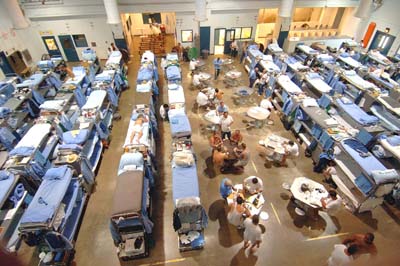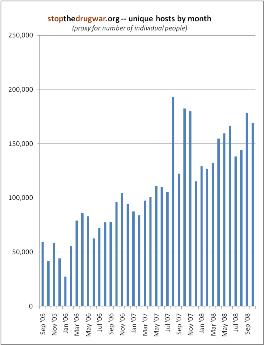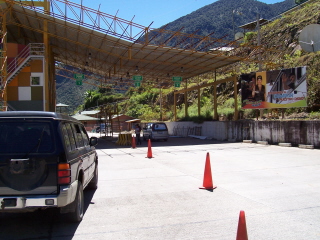Marijuana won big in Tuesday's election. Every state and local initiative on the ballot won, and by impressive margins, despite the best efforts of cops, prosecutors, and the drug czar.
California's "treatment not jail" Proposition 5 is defeated and so is one "tough on crime" initiative, but another one won favor with Golden State voters. Meanwhile, dueling "tough on crime" initiatives also passed in Oregon.
StoptheDrugWar.org (DRCNet) is a nonpartisan organization, and no major party nominee for US President has yet supported enough of our mission to change that. Nevertheless, the views expressed in President-Elect Obama's books, speeches and campaign appearances are mostly positive, and enactment of them would make a major difference in drug policy and help many thousands of people. We need your help and your participation to fight this important fight at this time of opportunity.
Another NYPD bad apple, a probation officer with a bad habit, and more jail guards ending up on the inside looking out.
Who will replace drug czar John Walters in an Obama administration? The early speculation centered on LAPD Chief William Bratton, but now he has removed himself from consideration.
New regulations that stipulate how much medical marijuana Washington state patients can grow and possess are now in effect.
At ten years out, Students for Sensible Drug Policy is stronger than ever. Please come out for this special conference and alumni reunion.
The US has spent $6 billion on Plan Colombia since 1999. The goal was to reduce coca and cocaine production by half. They didn't even come close, a new GAO report reveals.
Two of Mexico's top drug fighters were killed Tuesday in an unexplained plane crash in Mexico City. The Mexican press is rife with speculation they were assassinated.
The Philippines Supreme Court has ruled on the constitutionality of random, suspicionless drug testing. It's fine for students and workers, but not for politicians or criminal defendants, the court held.
Already chilly relations between Bolivia and the US grew even chillier this weekend, as Bolivia's President Morales told the DEA to take a hike.
Copenhagen's counterculture enclave of Christiania has been under attack by the conservative Danish government, but now its residents are fighting back in the courts as well as the streets.
Events and quotes of note from this week's drug policy events of years past.
"MSNBC Notices Popular Support for Marijuana Reform," "Will Obama End the Medical Marijuana Raids?," "Drug Czar Appointment Watch: William Bratton Says 'No Thanks'," "A Mandate For Marijuana Reform," "Medical Marijuana Wins in Michigan," "Mark Souder Re-elected in Indiana," "Huge Win for Marijuana Decriminalization in Massachusetts," "Drug Czar Mixes Cannabis, Caffeine, and Cartography With Catastrophic Results," "Could the Next Drug Czar be William Bratton?," "Mexico's Top Drug Cop Resigns Amidst Corruption Controversy," "If You're in California, Support Treatment-Not-Incarceration for Drug Offenses," "If You're in Michigan, Support Medical Marijuana," "If You're in Massachusetts, Support Marijuana Decriminalization."
Apply for an internship at DRCNet for this fall (or spring), and you could spend the semester fighting the good fight!
StoptheDrugWar.org (DRCNet) is seeking volunteers in the DC area to help with our membership drive; and from anywhere to help with a writing-based project starting next month.
Do you read Drug War Chronicle? If so, we need your feedback to evaluate our work and make the case for Drug War Chronicle to funders. We need donations too.
Support the cause by featuring automatically-updating Drug War Chronicle and other DRCNet content links on your web site!
A new way for you to receive DRCNet articles -- Drug War Chronicle and more -- is now available.
Visit our new web site each day to see a running countdown to the events coming up the soonest, and more.
Barack Obama wasn't the only big winner in Tuesday elections; marijuana polled just as well, if not better. A medical marijuana initiative in Michigan -- the first in the Midwest -- and a decriminalization initiative in Massachusetts both won by convincing margins, and scattered local initiatives on various aspects of marijuana policy reform all won, too.

marijuana plants
In both the statewide initiatives, reform forces overcame organized opposition on their way to victory, mostly from the usual suspects in law enforcement and the political establishment. Michigan enjoyed the dubious distinction of a visit from John Walters, the drug czar himself, who popped in to rail against medical marijuana as "an abomination."
"We could be seeing a sea change in more ways than one in this election," said Bruce Mirken, communications director for the Marijuana Policy Project (MPP), which backed both state initiatives. "These are not just wins, but huge wins. In two very blue states, marijuana reform outpolled Barack Obama. At this point, we can look members of Congress in the eye and ask them why exactly they think marijuana reform is controversial."
The results are also an indicator of the decreasing influence of the drug czar's office, said Mirken. "A clear public mandate has emerged, and it's particularly noteworthy coming as it does after eight years of the most intense anti-marijuana campaign from the feds since the days of Reefer Madness," he said. "Despite all the press releases and press conferences, despite all the appearances and campaigning Walters has done to try to convince Americans that marijuana is some sort of scourge, the voters just said no."
In Michigan, the medical marijuana initiative organized by the local Michigan Coalition for Compassionate Care and backed in a big way by MPP won a resounding 63% of the vote. Michigan's new medical marijuana law will go into effect quickly -- ten days after the elections are certified, with the Department of Community Health having 120 additional days to come up with regulations for a registry.
The law will allow patients suffering from HIV/AIDS, cancer, glaucoma and other conditions to obtain a doctors' recommendation to cultivate, grow, and possess marijuana without fear of prosecution under state law. Registered patients may possess up to 2.5 ounces of usable marijuana and have up to 12 plants in a secure indoor facility, or they may designate a caregiver to grow it for them.
"Michigan voters have clearly signaled in no uncertain terms their support for a compassionate medical marijuana law," the committee said in a victory statement Tuesday night. "Our opposition threw the kitchen sink at us, hoping one of their false claims and outright lies would cost enough votes to tank this effort. But Michigan voters saw through the deception, and soon numerous seriously ill patients across the state will no longer need to live in fear for taking their doctor-recommended medicine."
Tuesday's win makes Michigan the 13th medical marijuana state, and, more importantly, the first one in the Midwest. The Michigan victory means planned or ongoing efforts in states like Wisconsin, Ohio, Minnesota, and Illinois just got a little easier.
In Massachusetts, Question 2, the marijuana decriminalization initiative, overcame the opposition of every district attorney in the state to win a resounding 65% of the vote. Now, instead of an arrest and possible six months in jail, people in the Bay State caught with less than an ounce of marijuana will face a simple $100 fine. Equally importantly, small-time possession offenders will not be saddled with a Criminal Record Information Report (CORI), a state arrest report that lingers long after the offense and can impede an offender's ability to obtain jobs, housing, and school loans.
Again backed by MPP, the Bay State's Committee for Sensible Marijuana Policy (CSMP) took the organizing lead in Massachusetts this year. Building on nearly a decade's worth of winning local questions on marijuana policy reform by groups like the Drug Policy Forum of Massachusetts and the state NORML affiliate, MassCann/NORML, the committee was able to go over the top statewide with decrim this year.
"It's great to see the people of Massachusetts were able to see what a sensible, modest proposal Question 2 is," said CSMP head Whitney Taylor. "It's going to end the creation of thousands of new people being involved in the criminal justice system each year and refocus law enforcement resources on violent crime."
While some prosecutors are already whining about having to implement the will of the voters, there appears little chance that legislators will attempt to step in and overturn the vote, as they could do under Massachusetts law. A spokesman for House Speaker Sal DiMasi told local WBZ-TV as much Wednesday afternoon.
"Question 2 now has the force of law and the Speaker sees no reason to consider a repeal or amendment at this time," said David Guarino, DiMasi's deputy chief of staff.
Statewide decrim wasn't the only marijuana-related issue on the ballot for some Massachusetts voters. Continuing the tradition of placing questions on representative district ballots, voters in four districts were asked: "Shall the state representative from this district be instructed to vote in favor of legislation that would allow seriously ill patients, with their doctor's written recommendation, to possess and grow small amounts of marijuana for their personal medical use?"
As with past medical marijuana questions, the question passed overwhelmingly in all four districts.
The question passed with 74% In the 1st Middlesex Representative District (R â Robert S. Hargraves), 71% in the 21st Middlesex Representative District (D â Charles A. Murphy), 73% in the 13th Norfolk Representative District (D â Lida E. Harkins), and 71% in the 6th Plymouth Representative District (R â Daniel K. Webster).
Meanwhile, in other local marijuana-related initiatives:
- Berkeley, California's, Measure JJ, essentially a zoning initiative that would allow dispensaries operating in the city to expand into more non-residential districts, won with 62% of the vote. The campaign was organized by Citizens for Sensible Medical Cannabis Regulation.
- In Hawaii County, Hawaii (the Big Island), a lowest law enforcement priority initiative for adult marijuana possession won with 66% of the vote. The campaign organized by Project Peaceful Skies was an outgrowth of the movement to end intrusive marijuana eradication raids.
- In Fayetteville, Arkansas, another lowest priority initiative passed. Some 62% of voters in the Northwest Arkansas college town agreed with Sensible Fayetteville and its director, Ryan Denham, that police had better things to do than bust pot smokers. Sensible Fayetteville itself is an umbrella organization including the Alliance for Drug Reform Policy in Arkansas, The Omni Center for Peace, Justice & Ecology, the Green Party of Washington County, University of Arkansas NORML and the Alliance for Reform of Drug Policy in Arkansas Inc.
"We think these election results send an extremely important message," Denham told the Northwest Arkansas Times Wednesday. "I'm not surprised since national statistics say that 70% of Americans feel that misdemeanor marijuana offenses should be a low priority. It clogs courts and jails and puts a burden on taxpayer resources."
Election day was a good day for marijuana reform. Let's hope that activists and politicians alike are now prepared to press for more in the near future.
back to top
Tough on crime can still trump smart on crime, if Tuesday's elections results on sentencing initiatives in two of the nation's most progressive states are any indication. In Oregon, voters approved two competing initiatives that will increase sentences and prison populations, while in California, a multi-million dollar campaign to dramatically reform sentencing went down in the face of opposition from prison guards and politicians, and another initiative that will see longer sentences and more prisoners was approved by voters.

overcrowding at Mule Creek State Prison (from cdcr.ca.gov)
In California, the
Drug Policy Alliance and the
Campaign for New Drug Policies pumped nearly $8 million into the effort to pass
Proposition 5, the Nonviolent Offenders Rehabilitation Act (NORA). NORA would have deepened and vastly expanded the "treatment not jail" sentencing reforms passed in 2001 as Prop. 36. While the Legislative Analyst's Office estimated it would cost $1 billion a year to implement, it also estimated that it would save $1 billion a year in prison costs, as well as $2.5 billion in savings from prisons that would not have to be built.
NORA had the near unanimous support of the drug treatment community, as well as the League of Women Voters of California, the Children's Defense Fund-California, the California Nurses Association, the California Federation of Teachers, the California Society of Addiction Medicine, the California State Conference of the NAACP and the National Council of La Raza, among others.
But a deep-pocketed opposition led by five current and former governors whose policies helped to create California's seemingly never-ending prison crisis and financed largely by the people who most directly benefit from increased prison populations, the California prison guards' union, undermined public support for NORA. The measure was also opposed by another group whose ox would have been gored, the drug court professionals -- arguably a part of the treatment community, but just as arguably a part of the law enforcement community. Several prominent state newspapers and actor Martin Sheen joined the opposition as well.
"It is a great threat to our neighborhoods," Gov. Arnold Schwarzenegger said at a news conference featuring the assembled governors outside the Criminal Courts Building in downtown Los Angeles last Thursday. "It was written by those who care more about the rights of criminals."
The measure "will cost dollars and it will cost lives," chimed in former Gov. Gray Davis, a Democrat, neglecting to mention that it would have saved many more dollars than it would have cost.
It wasn't just the governors. Sen. Dianne Feinstein and Attorney General Jerry Brown, also Democrats, opposed the measure too, and taped TV commercials against it. "Say no to drug dealers," Feinstein said in her ad, while Brown -- whose spot was paid for by the prison guards union -- called it "a complicated measure" that would "limit court authority over drug dealers and addicts who refuse treatment."
All told, the organized opposition pumped nearly $3.6 million into defeating NORA, more than half of it coming from the prison guards' union. And it worked -- on election day, NORA went down to defeat by a margin of 61% to 39%.
In a statement Tuesday evening when the outcome became apparent, Yes on 5 campaign spokeswoman Margaret Dooley-Sammuli laid the defeat at the door of the opposition. "Today we saw special interests overpower the public interest," she said. "California's prison guards poured millions of dollars into stopping Prop. 5 and securing this victory for the poison politics of crime."
Stopping NORA would be a pyrrhic victory, Dooley-Sammuli predicted, citing a looming federal court hearing on whether to take control of the overcrowded, under-budgeted prison system.
"The prosecutors and prison guards who led the campaign against Prop. 5 got their way tonight -- but they've really lost. The next step for our prisons will probably be a federal takeover. Prop. 5 was Californians' last, best chance to avoid a takeover and make our own choices about how to address prison overcrowding. Now federal judges are likely to impose solutions that no one will be happy about."
The effort to pass NORA was "not in vain," Dooley-Sammuli added. "Prop. 5 presented a vision for a future in which we do more for young people with drug problems, and improve the way we provide court-supervised treatment in California. There is plenty to build on going forward," she said.
But Golden State voters were still seduced by the "tough on crime" message that has played so well in California since the days of Ronald Reagan. While defeating NORA, they passed Proposition 9, also known as the Crime Victims Bill of Rights Act, by a margin of 53% to 47%. Naturally enough, the measure is concerned primarily with victims' rights, but also includes provisions that block local authorities from granting early release to prisoners to alleviate overcrowding and mandates that the state fund corrections costs as much as necessary to accomplish that end. It also lengthens the amount of time a prisoner serving a life sentence who has been denied parole must wait before re-applying. Currently, he must wait one to five years; under Prop. 9, he must wait three to 15 years. Prop. 9 would also allow parolees who have been jailed for alleged parole violations to be held 15 days instead of the current 10 before they are entitled to a hearing to determine if they can be held pending a revocation hearing, and stretches from 35 to 45 the number of days they could be held before such a hearing. These last two provisions, as well as one limiting legal counsel for parolees, all conflict with an existing federal court order governing California's procedures.
But if "tough on crime" still sells, another measure, Proposition 6, the Safe Neighborhoods Act, was too hard-sell even for California's crime-weary electorate. That measure, which was aimed primarily at gang members, violent criminals, and criminal aliens, also included provisions increasing penalties for methamphetamine possession, possession with intent, and distribution to be equal to those for cocaine, and provided for the expulsion from public housing of anyone convicted of a drug offense. The measure also mandates increased spending for law enforcement. It lost 69% to 31%.
"Tough on crime" worked this year in Oregon, too, with two competing measures that would ratchet up sentences and prison populations both passing. Measure 57, a legislative measure placed before the voters, and Measure 61, the brainchild of inveterate Oregon crime-fighter and initiative-generator Kevin Mannix, won with 61% and 51% of the vote, respectively.
The Mannix measure, the tougher of the two, would have set mandatory minimum sentences for a number of offenses, including drug sales, and is projected to add between 4,000 and 6,000 new inmates to the prison system over the next five years at a cost of between $500 million and $800 million. But because it garnered fewer votes than Measure 57, the latter is the one that will actually become law.
Measure 57 increases some sentences for repeat offenders and includes funding for behind-bars drug treatment. It is estimated to generate 1,670 additional prisoners over the next five years at a cost of $411 million, as well as requiring the state to borrow another $314 million for new prison construction.
Even with the national economy in a free-fall and state budgets increasingly feeling the squeeze, it looks like it's still easier to win with the politics of fear than with the politics of justice and compassion.
back to top
Dear drug law reformer:
New times bring new opportunities.
StoptheDrugWar.org (DRCNet) is a nonpartisan organization, and no major US party presidential nominee has supported enough of our mission to date for this to change. That said, the views on drug policy and criminal justice expressed by President-Elect Obama in his books, speeches, and campaign appearances add up to a platform that is mostly positive, and which if enacted would make a major difference in our issue helping many thousands of people.
These include causes near and dear to the hearts of drug reformers: Stopping the raids on medical marijuana clinics; Repealing unjust mandatory minimum sentences, including the infamous crack cocaine penalties; Decriminalizing marijuana (sort of); Ending racial profiling; Lifting the federal needle exchange funding ban; Eliminating barriers to integration faced by ex-offenders, to name several.
Changes like these can happen if, but only if, people like you and I take action to work for change. Please make a generous donation to support StoptheDrugWar.org's lobbying programs, and please stay tuned for the crucial action alerts we will be sending you over the coming months. Your non-deductible donations will help us hire lobbying staff and purchase tools to be able to efficiently communicate with Congressional staffers.
 If you need or strongly prefer to make a tax-deductible donation, or if doing so will enable you to donate much more generously, select "tax-deductible donation" on our donation form to support our educational work. StoptheDrugWar.org web site traffic has grown at 60% per year for the past two years, as the chart to the left shows, bringing our average number of visitors to more than 150,000 per month. Nearly two hundred thousand people are verified to have read election-related drug policy coverage on our web site since the primaries began in earnest last year, and that doesn't include the most numerous number of our readers, those who read the content on our daily blog on our home page.
If you need or strongly prefer to make a tax-deductible donation, or if doing so will enable you to donate much more generously, select "tax-deductible donation" on our donation form to support our educational work. StoptheDrugWar.org web site traffic has grown at 60% per year for the past two years, as the chart to the left shows, bringing our average number of visitors to more than 150,000 per month. Nearly two hundred thousand people are verified to have read election-related drug policy coverage on our web site since the primaries began in earnest last year, and that doesn't include the most numerous number of our readers, those who read the content on our daily blog on our home page.
We continue to offer a wide range of books, videos and StoptheDrugWar.org gift items to members donating over certain levels --
visit our donation page to read the full list. Also, everyone donating this week will receive a complimentary StoptheDrugWar.org "Truth Campaign" notepad folder, and all donors will receive a StoptheDrugWar.org bumper sticker and a square StoptheDrugWar.org stop sign sticker, both being reprinted this month.
Drug policy reform is such an important issue, but it's an important issue that needs your help. We at StoptheDrugWar.org need you to ensure that this time of change, will bring needed change, for a disadvantaged, demonized and under-represented group in our society, the targets of the brutal War on Drugs. Please donate today, and together we will make things happen.
Thank you very much for working to change this country’s drug policies and for continuing to be part of StoptheDrugWar.org. And thank you for giving your support to our efforts at this important hour. Your contribution has never been more important.

David Borden
Executive Director, StoptheDrugWar.org (DRCNet)
News & Activism Promoting Sensible Reform
P.S. Every day that goes by, 4,000 people are arrested for drug offenses, the vast majority of them minor, and half a million nonviolent drug offenders languish yet another day in the staggering number of prisons and jails the government has very unwisely built. It's time to stop this senseless tragedy and shocking injustice. Please increase your commitment to ending the drug war by donating to StoptheDrugWar.org today. Thank you!
back to top
Another NYPD bad apple, a probation officer with a bad habit, and more jail guards ending up on the inside looking out. Let's get to it:
In New York City, an NYPD officer has been jailed pending trial after being accused of being part of a gang that robbed drug dealers in six states ranging from New York to North Carolina. Officer Jorge Arbaje-Diaz was indicted for conspiracy to violate the Hobbs Act (extortion by force), possession and distribution of cocaine, and firearms charges. Arbaje-Diaz reportedly wore his police uniform in some of the 100 armed robberies attributed to the gang, which managed to steal some 1,500 pounds of cocaine and $4 million in cash from dealers.
In Vale, Oregon, an Eastern Oregon probation officer was arrested October 30 for apparently stealing drugs. Sydnie Maglaughlin, 36, is charged with possession of a controlled substance, third-degree theft and third-degree official misconduct. Maglaughlin worked as a corrections technician for the Malheur County Work Release Program from 2004 to 2006, when she transferred to the probation office. She has posted $1,500 bail and is free pending trial.
In Panama City, Florida, a Bay County jail guard was arrested Wednesday after she was caught bringing pain pills to work. It apparently wasn't the first time. Angela Lavonne Chiles now faces charges of introduction of contraband into a detention facility and unlawful compensation for official behavior. She has now been fired and is currently looking out from the other side of the bars.
In Worcester, Massachusetts, a former jail guard at the Worcester County House of Corrections was sentenced October 30 to two years in prison for smuggling oxycodone into the jail. Matthew Mahoney, 25, had been convicted in federal court on charges of conspiracy to distribute oxycodone and possession of oxycodone with intent to distribute. Mahoney was caught in 2007 smuggling between 80 and 100 pills into the jail. He must report to prison by December 1.
back to top
With Tuesday's election now behind us, and the incoming Obama administration turning its attention to filling all those cabinet and White House posts, speculation is already starting about who will replace outgoing drug czar John Walters as head of the White House Office of National Drug Control Policy (ONDCP). Actually, the speculation began even before the election was over.

William Bratton
On October 31, the Washington insider news organization
Politico reported that Los Angeles Police Chief William Bratton was on the short list to replace Walters. In fact, Bratton was the only name on the list.
It was an interesting, if not particularly inspiring, call. As police chief in Los Angeles, Bratton has not been a serious foe of medical marijuana, but in his earlier incarnation as New York City police commissioner in the mid-1990s, his NYPD arrested tens of thousands of people a year for petty marijuana offenses, subjecting them to an average 24-hour stay in the city's stinking jails before arraignment. Bratton is also an advocate of the "broken windows" model of policing, which in the mutated form it took in New York under his and Rudy Giuliani's leadership insists that the way to control serious crime is to control not-so-serious crime -- despite rumors of privately-held reformist views on Bratton's part, New York City's marijuana arrest rate increased by a whopping factor of ten, and have yet to decrease again.
But surveying Bratton's career for how he might behave as drug czar is already an exercise in futility. The Los Angeles Times reported yesterday that Bratton has said he is not heading for Washington to replace Walters. "That is not something I am seeking, it's not something I have been approached about," Bratton said. "No reason to leave Los Angeles -- they pay me very well."
So now, it's back to the drawing board for drug czar speculators. Drug War Chronicle will be touching base with various people in the next week to try to get a better handle on who may end up running federal drug policy, or whether we even need a drug czar. Stay tuned.
back to top
New rules governing the amount of medical marijuana Washington state patients can possess and grow went into effect Sunday. After holding public hearings and consulting with law enforcement, health workers, and medical marijuana advocates, the Washington State Department of Health has set those quantities as 24 ounces of usable marijuana and up to 15 plants.
Under Washington's medical marijuana law, patients are entitled to a 60-day supply, but just what constituted a 60-day supply had not been defined until now. While the new rules should provide some guidance and protection for patients, not everyone is happy.
One medical marijuana grower told KOMO-TV News the new rules could lead to a crackdown on growers who are growing for more than one patient. The Washington law does not allow for growing co-ops. "That's a totally ridiculous way to come up with a 60-day supply," he said, noting that he has 37 plants growing in his basement.
"Our goal in the rule making was to have a final rule that provided clarity for law enforcement, for patients and physicians and meets the needs that what we believe will be the majority of medical marijuana patients in Washington," said Karen Ann Jensen, assistant secretary for health systems and quality assurance, who made the recommendation and will oversee the rules change.
back to top
It's here. And you won't want to miss it.
This November 21-23, you are invited to join hundreds of students, alumni, and drug policy reform advocates from around the world in creating a society that embraces sensible drug policy. You are invited to bridge political divides, reconnect with lost friends and alumni, and magnify the diversity of the drug policy reform student advocacy network.
You are invited to help "Connect the Dots"...
CONNECTING THE DOTS:
Students for Sensible Drug Policy's 10th Annual Conference and Alumni Reunion, November 21-23, 2008, The University of Maryland, College Park (just outside of Washington, DC)
It's hard to believe it's been ten years since those pioneers at the Rochester Institute of Technology first called themselves "Students for Sensible Drug Policy," sparking what would become a vibrant international network of students and youth working to put an end to the senseless War on Drugs.
Since then, SSDP has seen explosive growth in chapter numbers world-wide, won decisive legislative victories, and come to be seen as a credible source of information by lawmakers and media across the country. Over the course of ten years, SSDP has graduated thousands of alumni, many of whom forged lasting friendships with one another during the annual conferences.
But "Connecting the Dots" isn't just about celebrating successes... it's about energizing, training, and mobilizing a new generation to give the Drug War establishment a run for its money over the next ten years.
So why wait? Secure your seat at the conference now, and get those plane tickets while they're still inexpensive. Visit http://www.ssdp.org/conference to register today!
If you are a student who is committed to drug policy reform but you are unable to afford the trip, there are scholarships available to help pay for travel and lodging. Apply now.
For further information, contact Amber Langston, SSDP Outreach Director: Eastern Region, Students for Sensible Drug Policy, (202) 293-4414 or [email protected].
back to top

coca eradication in Plan Colombia (courtesy SF Bay Area IndyMedia)
Washington's ambitious $6 billion investment in wiping out Colombia's coca crops and cocaine production has been a failure, the GAO said in a
report released Wednesday. The aid program, known as Plan Colombia, had a goal of reducing Colombian coca and cocaine production by half between 2000 and 2006, but instead of shrinking, coca production was up 15% and cocaine production was up 4%, the review found.
Or, as the GAO diplomatically put it: "Plan Colombia's goal of reducing the cultivation, processing, and distribution of illegal narcotics by 50 percent in 6 years was not fully achieved."
By all accounts, Colombia has been and remains the world's number one coca and cocaine producer. It is estimated that 90% of the cocaine reaching the US is from Colombia. Despite years of aerial eradication with herbicides, as well as manual eradication, Washington and Bogotá have been unable to put a serious dent in the Colombian coca and cocaine trade. The inability to suppress coca and cocaine production "can be explained by measures taken by coca farmers to counter US and Colombian eradication efforts," the report said.

anti-Plan Colombia poster (courtesy Colombia IndyMedia)
The report was commissioned by Sen. Joe Biden (D-DE), chairman of the Senate Foreign Relations Committee. It could provide powerful ammunition for congressional foes of Plan Colombia, who are seeking to reduce US assistance to the government of President Ãlvaro Uribe, many of them citing human rights violations by the Colombian military and the right-wing paramilitaries, who have an ambiguous relationship with the Colombian government.
The report calls for aid cuts and advises US and Colombian officials to "develop a joint plan for turning over operational and funding responsibilities for US-supported programs to Colombia." It also called for USAID, which has administered more than $1.3 billion in alternative development funding, to come up with methods of measuring whether its efforts were having any impact.
The GAO did give Washington and Bogotá credit for improving Colombia's security climate "through systematic military and police engagements with illegal armed groups and by degrading these groups' finances." But, as we reported last week, Amnesty International has found that the human rights situation in Colombia remains atrocious, with thousands of killings each year and between two and three million Colombians displaced and living as refugees.
With Democrats in control of both Congress and the White House, Plan Colombia's days could be numbered, and a report like this one ought to kill the beast. But don't be surprised if it doesn't.
back to top
Two of Mexico's top anti-drug officials, the interior minister and the former chief federal anti-drug prosecutor, were killed Tuesday afternoon when the small plane in which they were traveling crashed in Mexico City as they prepared to land. Six others on the plane also died, as did seven others on the ground. At least 40 people were wounded in the crash in the Lomas de Chapultepec neighborhood of the capital.
Interior Minister Juan Camilo Mouriño had been tapped by President Felipe Calderón to lead the fight against Mexico's powerful and violent drug trafficking organizations. His death threatens that effort. Calderón named Mouriño interior minister in January. In September, Mouriño warned that drug traffickers were using their money to penetrate police forces and may be contributing campaign funds to candidates in next year's midterm elections.
Luis Santiago Vasconcelos, a high-ranking federal law enforcement official, was also killed. He had headed the attorney general's anti-drug prosecutor's office, SIEDO, during the Fox administration. As a long time federal law enforcement official, Vasconcelos had been involved in extremely sensitive probes of drug lords and political donors, and was reportedly the target of death threats in recent weeks.
Vasconcelos' former office, SIEDO, has been rocked in recent days by revelations that it had been infiltrated by drug trafficking groups. Similar allegations regarding the Federal Preventive Police led to the resignation of its head on Saturday.
While Mexican officials said there was no sign that the crash was anything other than an accident, almost nobody in Mexico believes that. Mexico City newspapers Wednesday were rife with speculation that one of the so-called cartels had assassinated the pair.
The internet news portal Lapolaka in the border town of Ciudad Juárez was looking both north and south as it pondered the day's events on both sides of the border: "A black president reaches the White House for the first time since the founding of the United States, violence in Ciudad Juárez reaches horrific levels and the Interior Minister of Mexico, Juan Camilo Mouriño, dies in an air accident that smells of criminal terrorism," Lapolaka declared. "It is the end of the world as we know it. The construction of a new, unknown one begins, which rises amid the ruins of a political, economic, social and moral system that's still not finished falling to pieces."
But meanwhile, Mexico's drug war continues apace. Whether or not Mouriño and Vasconcelos turn out to be its latest victims, prohibition-related violence shows no signs of abating. Some 53 people were killed in the violence Monday, the single highest one-day death toll yet. That means this year's toll is rapidly closing in on 5,000 dead, more than have been killed in Afghanistan this year.
back to top
The Philippines Supreme Court this week upheld mandatory, random, suspicionless drug testing of workers and high school and college students, but struck down as unconstitutional provisions of the Comprehensive Dangerous Drugs Act of 2002 that required drug tests for candidates for political office or those charged with criminal offenses.
In a unanimous decision written by Justice Presbitero Velasco Jr., the court noted that the law says the random drug testing of employees "shall be undertaken under conditions calculated to protect as much as possible the employee's privacy and dignity," and that employers are not required to report positive test results to prosecutors. It also found that "the intrusion into the employee's privacy... is accompanied by proper safeguards, particularly against embarrassing leakages of test results, and is relatively minimal."
In the case of students, the high court found that drug testing was not only constitutional, but perhaps even necessary. It noted the presence of drugs in the country "that threatens the well-being of the people, particularly the youth and school children who usually end up as victims," adding that, "until a more effective method is conceptualized and put in motion, a random drug testing of students in secondary and tertiary schools is not only acceptable but may even be necessary if the safety and interest of the student population, doubtless a legitimate concern of the government, are to be promoted and protected."
Candidates for political office, however, may not be subjected to drug tests as condition of candidacy, the court held. The drug law's provisions requiring testing of candidates unconstitutionally added to the constitution's provisions defining the qualification or eligibility of candidates, the Supreme Court said.
The court was equally kind to people charged with criminal offenses, holding that they cannot be drug tested because they might incriminate themselves and because drug testing in their cases would not be random or suspicionless. "To impose mandatory drug testing on the accused is a blatant attempt to harness a medical test as a tool for criminal prosecution, contrary to the objectives of RA 9165 [the drug testing law]. Drug testing in this case would violate a person's right to privacy guaranteed under Section 2, Article III of the Constitution. Worse still, the accused persons are veritably forced to incriminate themselves," the opinion declared.
back to top
Already cool relations between Bolivia and the US grew even chillier over the weekend, as Bolivian President Evo Morales announced Saturday that he was suspending anti-drug operations by the US DEA within Bolivian territory. In making the announcement, Morales accused the DEA of interfering in internal Bolivian affairs and trying to undermine his government.

US-funded FELCN (Special Force for the Struggle Against Narcotics) checkpoint between Cochabamba and Chapare, search being conducted for cocaine and precursors (photo by Chronicle editor Phil Smith, 2007)
"From today all the activities of the US DEA are suspended indefinitely," Morales said Saturday in remarks reported by the
BBC. "Personnel from the DEA supported activities of the unsuccessful coup d'etat in Bolivia," he added, referring to a September massacre of Morales supporters that left 19 people dead. "We have the obligation to defend the dignity and sovereignty of the Bolivian people."
Morales, a former coca grower union leader who won the presidency in 2006, has embarked on a policy of "zero cocaine, not zero coca" in the Andean nation where the coca plant is widely chewed or drunk as a tea by indigenous people. Under Morales' program, farmers in specified areas are allowed to grow small amounts of coca for traditional and industrial uses.
While US officials earlier this year acknowledged Bolivian successes in the fight against cocaine trafficking, tensions have been rising -- not all of them to do with coca and cocaine. The Bolivian government limited DEA activities earlier this year, then expelled the US ambassador, charging that he had supported an effort to overthrow the government by separatist leaders of eastern provinces in September. The US retaliated by expelling Bolivia's ambassador to Washington, and last month, by adding Bolivia to the list of nations that had not adequately met US drug war goals.
Although Bolivia is only the third largest coca producer in the region, behind Colombia and Peru, it and Venezuela were the only countries in Latin America that were decertified. Venezuela kicked out the DEA in 2005, citing internal interference as well.
US officials denied Morales' claim of DEA interference. "These accusations are false and absurd," an unnamed senior State Department official told Time in response to Saturday's announcement. "The DEA has a 35-year track record of working effectively and professionally with our Bolivian partners," the official added.
Some 70 Bolivian citizens have been killed and about 1,000 wounded combating DEA-led coca eradication efforts since the late 1980s. Unrest over coca control policies helped vault Morales to the presidency in 2006.
The US currently funds Bolivian anti-drug efforts with $35 million a year. It is unclear what will happen to that funding.
back to top
The residents of Christiania, a 900-person countercultural enclave that had been self-governing since hippies took over an abandoned military base in the center of Copenhagen in 1971, have petitioned the Danish courts in an effort to regain control over their community. The conservative national government cracked down on drug sales in the enclave's famous Pusher Street in 2004 and later announced plans to yuppify the district.

entrance to Christiania, Copenhagen (courtesy Wikimedia)
Christiania residents have fought back. When the government announced in 2004 it was cracking down,
cannabis dealers burned their own Pusher Street shops and retreated to cafes and apartments in a bid to blunt the drive. They sued the Danish government in 2006 claiming the right to use the land even if they don't own it.
Since then, there have been numerous clashes between residents and police, including street fighting two weeks ago that left two officers injured and 15 people arrested. That battle came as police tried to evict squatters. They fired tear gas at demonstrators, who responded by setting fire to police barricades and pelting police with rocks and Molotov cocktails.
"The plan by the government would destroy Christiania as we know it," Thomas Ertman, a spokesman for Christiania residents, told the Associated Press Monday.
The case is before the Eastern High Court and is set for a hearing by November 21. A decision is expected in January.
back to top
November 12, 1970: Keith Stroup forms the National Organization for the Reform of Marijuana Laws (NORML).
November 12, 1980: New York City Mayor Ed Koch admits to having tried marijuana.
November 8, 1984: The international marijuana seizure record is set (still in effect today) -- 4,260,000 lbs in Mexico.
November 8, 1987: The New York Times reports that Al Gore said he last used marijuana when he was 24. He said he first tried the drug at the end of his junior year at Harvard and used it again at the beginning of his senior year the next fall. He also said he used the drug "once or twice" while off-duty in an Army tour at Bien Hoa, Vietnam, on several occasions while he was in graduate school at Vanderbilt University and when he was an employee of a Nashville newspaper (The Nashville Tennessean). Three days later Gore is quoted in UPI: "We have to be honest and candid and open in dealing with the (drug) problem."
November 11, 1988: The Anti-Drug Abuse Act establishes the creation of a drug-free America as a policy goal. A key provision of the act is the creation of the Office of National Drug Control Policy (ONDCP) to set priorities, implement a national strategy, and certify federal drug-control budgets.
November 7, 2000: In California, citizens vote 61%-39% to pass Proposition 36, diverting nonviolent drug offenders into treatment rather than prison for first and second offenses. In Mendocino County voters approve a measure decriminalizing personal use and growth of up to 25 marijuana plants -- the Green Party-sponsored Measure G wins 52% of the vote.
November 13, 2000: The National Association of Criminal Defense Lawyers (NACDL) releases the final version of its "NACDL Board Resolution to End the 'War on Drugs.'"
November 9, 2001: The San Jose Mercury News reports that despite objections from former first lady Betty Ford and drug-treatment authorities, the US Senate Judiciary Committee approved the nomination of John Walters as director of the Office of National Drug Control Policy.
November 9, 2001: The Newark Star-Ledger reports that the US Food and Drug Administration approved the use of Ecstasy in a study to treat victims of post-traumatic stress disorder.
November 10, 2001: The Austin American-Statesman reports that police publicly apologized to Maria Flores for a botched drug raid on May 16.
November 7, 2002: Ruling in favor of NORML Foundation and Media Access Project complaints, the Federal Communications Commission says that public service announcements broadcast under the auspices of the White House drug office advertising program must identify themselves as being part of that program. As a result of the ruling, broadcasters are forced to insert tag lines stating "sponsored by the Office of National Drug Control Policy."
back to top
Along with our weekly in-depth Chronicle reporting, DRCNet has since late summer also been providing daily content in the way of blogging in the Stop the Drug War Speakeasy -- huge numbers of people have been reading it recently -- as well as Latest News links (upper right-hand corner of most web pages), event listings (lower right-hand corner) and other info. Check out DRCNet every day to stay on top of the drug reform game! Check out the Speakeasy main page at http://stopthedrugwar.org/speakeasy.

prohibition-era beer raid, Washington, DC (Library of Congress)
Since last issue:
Scott Morgan writes: "MSNBC Notices Popular Support for Marijuana Reform," "Will Obama End the Medical Marijuana Raids?," "Drug Czar Appointment Watch: William Bratton Says 'No Thanks'," "A Mandate For Marijuana Reform," "Medical Marijuana Wins in Michigan," "Mark Souder Re-elected in Indiana," "Huge Win for Marijuana Decriminalization in Massachusetts," "Drug Czar Mixes Cannabis, Caffeine, and Cartography With Catastrophic Results," "Could the Next Drug Czar be William Bratton?," "Mexico's Top Drug Cop Resigns Amidst Corruption Controversy," "If You're in California, Support Treatment-Not-Incarceration for Drug Offenses," "If You're in Michigan, Support Medical Marijuana," "If You're in Massachusetts, Support Marijuana Decriminalization."
David Guard posts numerous press releases, action alerts and other organizational announcements in the In the Trenches blog.
Please join us in the Reader Blogs too.
Again, http://stopthedrugwar.org/speakeasy is the online place to stay in the loop for the fight to stop the war on drugs. Thanks for reading, and writing...
back to top
Want to help end the "war on drugs," while earning college credit too? Apply for a DRCNet internship for this spring or summer semester and you could come join the team and help us fight the fight!
DRCNet (also known as "Stop the Drug War") has a strong record of providing substantive work experience to our interns -- you won't spend the summer doing filing or running errands, you will play an integral role in one or more of our exciting programs. Options for work you can do with us include coalition outreach as part of the campaign to repeal the drug provision of the Higher Education Act, and to expand that effort to encompass other bad drug laws like the similar provisions in welfare and public housing law; blogosphere/web outreach; media research and outreach; web site work (research, writing, technical); possibly other areas. If you are chosen for an internship, we will strive to match your interests and abilities to whichever area is the best fit for you.
While our internships are unpaid, we will reimburse you for metro fare, and DRCNet is a fun and rewarding place to work. To apply, please send your resume to David Guard at [email protected], and feel free to contact us at (202) 293-8340. We hope to hear from you! Check out our web site at http://stopthedrugwar.org to learn more about our organization.
back to top
StoptheDrugWar.org (DRCNet) is seeking enthusiastic volunteers for two important purposes:
Membership Drive: Do you live in Washington, DC or nearby? We need help from friendly drug reform enthusiasts who are willing to spend a couple of hours on one or more evenings working the phones for DRCNet's membership fundraising drive. This effort will take place on Tuesday, Wednesday and Thursday evenings, starting this coming week. (No session on election day.) Volunteers will be calling previous DRCNet contributors. Come on out, enjoy free pizza and other snacks, make new friends, and help raise needed funds for the cause while gaining valuable phone-banking experience. E-mail [email protected] or call us at (202) 293-8340 ext. 301 for further information or to sign up.
Writers: In the second half of November or early December, StoptheDrugWar.org will be carrying out an ambitious week-long writing-based campaign dealing with the mainstream media's coverage of drug issues, and we are seeking a team of good volunteer writers to be part of it. Along with writing skills, volunteers for this project should have a fairly good understanding of the effects of drug prohibition -- visit our Site Map page and scroll down to the "Consequences of Prohibition" section to get an idea of what we mean by that. Contact David Borden at [email protected] or (202) 293-8340 ext. 301 for further information about this very exciting effort.
back to top
Do you read Drug War Chronicle? If so, we'd like to hear from you. DRCNet needs two things:
- We are in between newsletter grants, and that makes our need for donations more pressing. Drug War Chronicle is free to read but not to produce! Click here to make a donation by credit card or PayPal, or to print out a form to send in by mail.
- Please send quotes and reports on how you put our flow of information to work, for use in upcoming grant proposals and letters to funders or potential funders. Do you use DRCNet as a source for public speaking? For letters to the editor? Helping you talk to friends or associates about the issue? Research? For your own edification? Have you changed your mind about any aspects of drug policy since subscribing, or inspired you to get involved in the cause? Do you reprint or repost portions of our bulletins on other lists or in other newsletters? Do you have any criticisms or complaints, or suggestions? We want to hear those too. Please send your response -- one or two sentences would be fine; more is great, too -- email [email protected] or reply to a Chronicle email or use our online comment form. Please let us know if we may reprint your comments, and if so, if we may include your name or if you wish to remain anonymous. IMPORTANT: Even if you have given us this kind of feedback before, we could use your updated feedback now too -- we need to hear from you!
Again, please help us keep Drug War Chronicle alive at this important time! Click here to make a donation online, or send your check or money order to: DRCNet, P.O. Box 18402, Washington, DC 20036. Make your check payable to DRCNet Foundation to make a tax-deductible donation for Drug War Chronicle -- remember if you select one of our member premium gifts that will reduce the portion of your donation that is tax-deductible -- or make a non-deductible donation for our lobbying work -- online or check payable to Drug Reform Coordination Network, same address. We can also accept contributions of stock -- email [email protected] for the necessary info.
back to top
Are you a fan of DRCNet, and do you have a web site you'd like to use to spread the word more forcefully than a single link to our site can achieve? We are pleased to announce that DRCNet content syndication feeds are now available. Whether your readers' interest is in-depth reporting as in Drug War Chronicle, the ongoing commentary in our blogs, or info on specific drug war subtopics, we are now able to provide customizable code for you to paste into appropriate spots on your blog or web site to run automatically updating links to DRCNet educational content.
For example, if you're a big fan of Drug War Chronicle and you think your readers would benefit from it, you can have the latest issue's headlines, or a portion of them, automatically show up and refresh when each new issue comes out.
If your site is devoted to marijuana policy, you can run our topical archive, featuring links to every item we post to our site about marijuana -- Chronicle articles, blog posts, event listings, outside news links, more. The same for harm reduction, asset forfeiture, drug trade violence, needle exchange programs, Canada, ballot initiatives, roughly a hundred different topics we are now tracking on an ongoing basis. (Visit the Chronicle main page, right-hand column, to see the complete current list.)
If you're especially into our new Speakeasy blog section, new content coming out every day dealing with all the issues, you can run links to those posts or to subsections of the Speakeasy.
Click here to view a sample of what is available -- please note that the length, the look and other details of how it will appear on your site can be customized to match your needs and preferences.
Please also note that we will be happy to make additional permutations of our content available to you upon request (though we cannot promise immediate fulfillment of such requests as the timing will in many cases depend on the availability of our web site designer). Visit our Site Map page to see what is currently available -- any RSS feed made available there is also available as a javascript feed for your web site (along with the Chronicle feed which is not showing up yet but which you can find on the feeds page linked above). Feel free to try out our automatic feed generator, online here.
Contact us for assistance or to let us know what you are running and where. And thank you in advance for your support.
back to top
RSS feeds are the wave of the future -- and DRCNet now offers them! The latest Drug War Chronicle issue is now available using RSS at http://stopthedrugwar.org/chronicle/feed online.
We have many other RSS feeds available as well, following about a hundred different drug policy subtopics that we began tracking since the relaunch of our web site this summer -- indexing not only Drug War Chronicle articles but also Speakeasy blog posts, event listings, outside news links and more -- and for our daily blog postings and the different subtracks of them. Visit our Site Map page to peruse the full set.
Thank you for tuning in to DRCNet and drug policy reform!
back to top
DRCNet's Reformer's Calendar is a tool you can use to let the world know about your events, and find out what is going on in your area in the issue. This resource used to run in our newsletter each week, but now is available from the right hand column of most of the pages on our web site.
- Visit http://stopthedrugwar.org each day and you'll see a listing of upcoming events in the page's right-hand column with the number of days remaining until the next several events coming up and a link to more.
- Check our new online calendar section at to view all of them by month, week or a range of different views.
- We request and invite you to submit your event listings directly on our web site. Note that our new system allows you to post not only a short description as we currently do, but also the entire text of your announcement.
The Reformer's Calendar publishes events large and small of interest to drug policy reformers around the world. Whether it's a major international conference, a demonstration bringing together people from around the region or a forum at the local college, we want to know so we can let others know, too.
But we need your help to keep the calendar current, so please make sure to contact us and don't assume that we already know about the event or that we'll hear about it from someone else, because that doesn't always happen.
back to top













